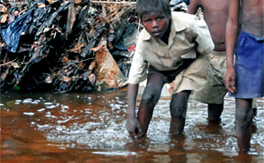Status of trace and toxic metals in Indian rivers
 This comprehensive study conducted by Central Water Commission on 387 river water quality stations covering 16 river basins found that water samples at 171water quality (WQ) stations were within the permissible limit for all purposes, while 100 stations were beyond the permissible limit due to presence of two or more toxic metals.
This comprehensive study conducted by Central Water Commission on 387 river water quality stations covering 16 river basins found that water samples at 171water quality (WQ) stations were within the permissible limit for all purposes, while 100 stations were beyond the permissible limit due to presence of two or more toxic metals.
 Water was considered unfit for use as per BIS standards in 92 WQ monitoring stations due to presence of Iron beyond permissible limit. Water Quality monitoring issues in Indian Rivers are assuming great importance in the present day context with increase in urbanization and rapid industrialization.
Water was considered unfit for use as per BIS standards in 92 WQ monitoring stations due to presence of Iron beyond permissible limit. Water Quality monitoring issues in Indian Rivers are assuming great importance in the present day context with increase in urbanization and rapid industrialization.
The Government of India has constituted Water Quality Assessment Authority (WQAA) to address these issues. A uniform protocol along with standardization of parameters has been made by WQAA to bring uniformity in analysis. Trace and toxic metals in the river water has large bearing on the health of human being, aquatic life and ecology. This publication is brought about to establish the spots that have been identified as having serious issues related to the presence of Trace and Toxic metals.
Related Content
- Status of trace and toxic metals in Indian rivers
- Report on river stretches for restoration of water quality: state wise and priority wise
- Order of the National Green Tribunal regarding pollution caused to River Beas and Satluj due to pollutants being discharged from industries, Punjab, 24/05/2018
- Draft Delhi Road Safety Policy, 2018
- Status of trace and toxic metals in Indian rivers 2018
- Judgement of the National Green Tribunal regarding severe pollution of the river Churni (Nadia District, West Bengal) resulting in huge fish kill, 21/09/2016
